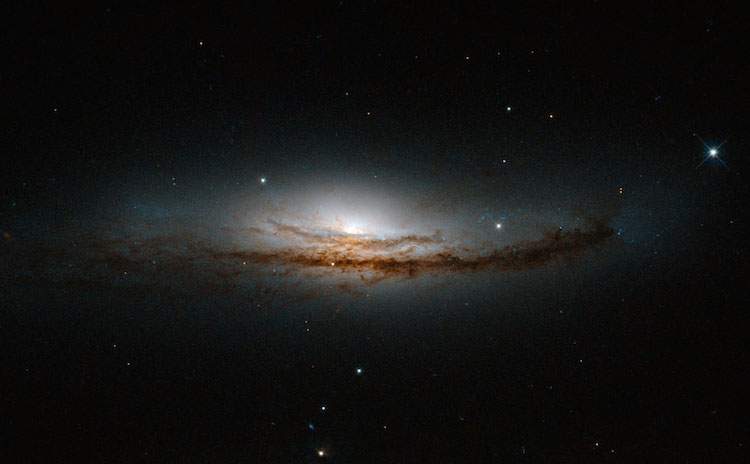Appreciating Nothingness: How to Not Fear Darkness and Emptiness

“What is behind the darkness of closed eyes?” ~Paramahansa Yogananda, Autobiography of a Yogi.”
Empty darkness—that’s what I see behind closed eyes.
Darkness and emptiness used to conjure up anxious thoughts and feelings.
For the longest time I feared the blackness of the night. As a child, I wanted a dim light left on till morning. It was the fear of monsters and demons.
When I got older, darkness embodied the unknown and my helplessness in the face of all the bad things that could happen.
I only got over my fear of darkness (unintentionally) when we lost power for a few weeks, and I didn’t have any other choice but to learn to live with pitch-black nights.
I discovered then the amazing adaptability of our eyes and senses, and the inherent trust in life when we live what we fear instead of thinking about it.
What is darkness?
Can darkness be quantified or measured? Does it have limits and boundaries?
Is darkness merely the absence of light?
What is empty space?
Empty space is usually viewed as something that’s cold, lifeless, and devoid of beauty.
Can we measure emptiness without any visible objects?
How many of us are comfortable sitting in an empty room?
Who’s comfortable with his or her voice echoing across empty walls?
Darkness and emptiness, to many of us, remind us of death and the feared unknown.
The invisible in science is considered dark—dark matter (approximately 23% of the mass of the universe) and dark energy (around 73% of the universe). Most of the universe is invisible to us.
How do we cope with darkness and emptiness?
We usually fill our homes with furniture, light fixtures, wall paintings, and stuff. A house cannot be a home without belongings that make it ours.
We stuff our schedules trying to squeeze as many things out of our time as possible. We fear empty time and missing out on life.
If we could sleep with eyes wide open, we might do it, just to avoid the empty and boundless darkness.
More than a year ago, and after long hours of reading, I came to this conclusion:
A truer perspective: Empty darkness is something (not nothing)
There is another way of looking at things. It’s not faith based and it doesn’t require a lot of brainpower. What’s needed is a different perspective, a holistic outlook, if you will.
I used to think that darkness was merely the absence of light, but not any more.
Instead of viewing darkness as devoid of light and life, we can consider it the backdrop upon which light exists.
Without darkness we wouldn’t be able to see and appreciate the light.
Can you paint on a canvas full of color and shapes? If you don’t have an empty canvas, or space on an existing canvas, can you paint anything?
If you were in an environment of constant loud noise, could you hear the music? Silence is what allows sound to be.
Can we have galaxies, stars, and life without the dark and empty space that holds it all?
Do the clouds fear the sky? Or do the colors fear the blank canvas?
Darkness and space are not lifeless.
Dark space is the container in which life expresses itself—the blank canvas that awaits the paintbrushes of all of creation, the silent space upon which music notes reverberate, and the empty field of perception upon which seeds of thoughts and ideas are planted.
Empty space around us, and within us, is what allows us to exist and be. If it was nothing, it would remain nothing, but it does respond to physical and energetic change. I imagine dark space swaying to the dance of matter and energy.
We are mostly empty space
If you removed all the space out of the atoms in all the people in the world, the entire human race would fit in the volume of a sugar cube.
The universe is more than 99.999% empty space. Only about 0.0000000000000000000042 percent contains any matter!
Basically we are empty space. The empty space (which may or may not be intelligent itself) allows for intelligence not only to be, but also to evolve.
What’s at your core?
Close your eyes and look within.
If you were to dive into the core of your intelligence, your intuition, your thoughts, your feelings, your memories, your fears and aspirations:
What do you see?
What do you hear?
What do you feel?
In the depth of your being there is an empty dark space that is indescribable, vast, and eternal—the essence of your being—consciousness.
The darkness and emptiness within each one of us unite us with all of the dark space of the universe (or perhaps multiverse).
When we appreciate the darkness and emptiness of the universe within and without, we realize while we may never uncover all the mysteries of life, we are part of something infinite.
Empty dark space is what gives life context. It doesn’t have to be devoid of meaning and purpose. It’s what allows meaning and purpose to exist.
Darkness doesn’t have to be scary, and emptiness doesn’t have to feel lonely.
When someone asks you if you’re a glass half-full or glass half-empty kind of person, your answer won’t matter. There is beauty and value in the half that’s full. And …
There are limitless possibilities of what we can fill the empty half of the glass with.